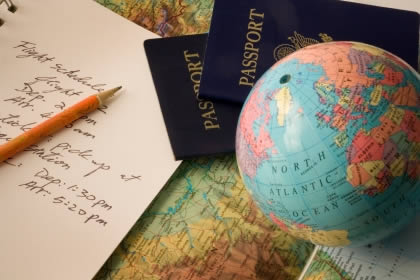Transportation costs (whether you’re traveling by plane, train or automobile) can eat up a large portion of one’s travel budget. A great way to save on transportation while in Europe is to consider a bike trip. The options are endless (depending on where you want to go and your level of fitness) as are the rewards (experience the beauty of Europe close-up, regular exercise means you can eat even more regional specialties, you have more control over your schedule). Here are some things to consider when planning a bike trip in Europe.
- Itinerary: For ease and peace of mind, it’s best to plan your general itinerary first. Think about your priorities (certain countries, landmarks, etc. that you want to see), logistics (how far you want to travel, for how long, etc.). Be realistic about your fitness level and how many kilometers you are willing to bike in a day. Consider the landscape(s) you will be traversing (are they hilly or flat, smooth terrain or rough, etc.). It may be a good idea to “pad” your itinerary with extra days, just in case you experience fatigue. Also, consider the general climate of the region you’ll be traveling in during the season/time frame of your trip. As a general rule, stick closer to the Mediterranean if you want sunny skies. Once you have identified these general elements, then it’s time to do some research. Most countries in Europe are “cyclist-friendly,” but it’s a good idea to do research online to make sure your plan is feasible. Now might be a good time to invest in some maps or a GPS system (on your smartphone or tablet, perhaps) to help you chart your course.
- Supplementary transportation: Of course, as soon as you get to Europe you can hop on your bike, but you have to get there in the first place. Consider how you will get there (plane, boat, etc.) and if you will need to take public transportation or trains to get you everywhere you want to go. Do you need to book tickets/reservations? If so, it’s best to do that as far in advance as you can. The good news is that bikes are relatively easy to bring on public transportation (including trains) in Europe. Also, since bikes are a daily part of European culture, you won’t get any strange looks when you board your train with a bike in tow. For longer train rides, some rail companies will require you to pay an extra fee for your bike. Make sure you check this out before you board the train.
- Lodging: Many people I know who have biked across Europe bring camping gear as well. Camping is, of course, inexpensive and relatively easy. If camping does not appeal to you, research hotels, hostels, or alternative lodging options in the region you’ll be visiting. Review your itinerary and figure out where/when you need to book accommodations. Depending on the season, you may be able to “wing it” a bit and find lodging as you go. However, if you plan on traveling during the high tourist season, it’s best to book accommodations in advance. Be sure to carefully record all of your lodging information (as well as phone numbers for other lodging options in the area) and bring it with you in case you fall behind on your itinerary and need to cancel reservations/change your plans.
- Gear: Generally speaking, you have two choices when it comes to gear: Bring it with you (pros: you know your own gear better than rental gear, it may be cheaper; cons: lost baggage, extra airline fees) or rent/purchase gear on-site (pros: allows you to travel lighter and avoid extra airline fees; cons: can be more expensive, you won’t really know the quality of the gear until you pick it up in Europe. Needless to say, it’s important to have a good bike (with a comfortable seat), anything less is sure to drain the enjoyment from your trip. Do some research on your options for renting/purchasing gear in Europe. Make sure you know exactly what you are getting.
- Extras: As you pack for your biking adventure, keep in mind that you will be spending the majority of your time outside, on a bike. Pack light, comfortable clothing, rain gear, sunscreen and good biking shoes. Think through the logistics of each day and pack accordingly.
Happy cycling!
